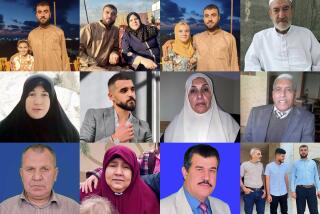4 of 5 Suicide Bombers Identified, Israel Says
- Share via
JERUSALEM — The Israeli government said Tuesday that at least four of the five suicide bombers who carried out recent attacks in Jerusalem have been identified by DNA tests and that they came from a West Bank village under joint Israeli and Palestinian control.
All four reportedly also had been prison mates in a Palestinian jail, where they landed during a mass roundup of suspected Islamic extremists that followed a wave of suicide bombings in Israel last year.
They escaped after six months in custody and disappeared, according to Israeli and Palestinian officials.
The men, said to be in their early to mid 20s, were identified as residents of a village near Nablus called Assira Shamaliya, a stronghold of the militant Islamic group Hamas.
Hamas claimed responsibility for the attacks in Jerusalem’s central market and along a downtown pedestrian mall that left 25 dead: 20 victims and the five bombers.
In an official bulletin released Tuesday night, Israel said the four names had been included in a list of 88 Hamas and Islamic Jihad militants whose arrest Israel sought after two men in business suits blew themselves up in the Mahane Yehuda Market on July 30. The list was given to Palestinian officials shortly after that attack.
Three more bombers, at least one of whom was dressed as a woman, blew themselves up on the cafe-lined Ben Yehuda promenade Sept. 4. In both Jerusalem attacks, the assailants’ bodies were obliterated, complicating the identification process.
Hamas and Islamic Jihad used to honor suicide bombers as heroes and martyrs, with farewell videos before the fatal attacks and family “celebrations” after their deaths. But Hamas stopped the public acclaim after seeing that it helped Israel crack down on its cells and served Palestinian Authority President Yasser Arafat in arresting nearly 900 activists in March of last year.
Palestinian officials said they had no independent confirmation of the bombers’ identities and had been kept in the dark by Israel until the information was released to the media Tuesday. The Israeli government said the bombers were Moawiya Jarara, 22; Bashar Salawah, 23; Tawfiq Yassin, 25; and Yusef Shouli, 22.
“Unfortunately, we have no information,” said Marwan Kanafani, a spokesman for Arafat. “We have never been part of the Israeli investigation or of Israel’s effort to find out what happened. . . . The fact is, if the Israeli story is true, that region is under their overall security control. It is not an area where we can send our troops.”
The village of Assira Shamaliya is under Palestinian civil administration and Israeli security control. It is supposed to be patrolled by combined Israeli-Palestinian units, although most of the joint patrols were suspended after clashes erupted between Israeli soldiers and Palestinian police over the opening of a new tunnel door in Jerusalem’s Old City a year ago.
While the bombers came from an area still under Israeli control, Prime Minister Benjamin Netanyahu charged that they were “activated, guided and sent from the Palestinian Authority areas.”
Israeli officials said that the explosives used in the attacks came from a bomb factory uncovered by the Palestinian Authority in Beit Sahur, near Bethlehem, this summer and that the Hamas infrastructure is in Palestinian-ruled areas.
Israeli authorities did not disclose how they zeroed in on the village or the alleged identities of the bombers.
Two weeks ago, Israeli soldiers took blood samples from the assailants’ relatives in Assira Shamaliya. On Sunday, Israel put up a blockade around the village of about 7,000 people, preventing residents from entering and leaving.
The Israeli security forces and forensics labs apparently matched the families’ blood and tissue to that of the bombers.
Parents of the alleged bombers told Israeli television that they knew their sons had escaped from a Palestinian jail in Nablus a year ago but said they had not seen them or spoken to them since and doubted that they were the assailants.
A Palestinian security official told Associated Press that security was lax in the jail and that inmates often were allowed to spend several hours a day in town. In September 1996, the four did not return from such an outing.
More to Read
Sign up for Essential California
The most important California stories and recommendations in your inbox every morning.
You may occasionally receive promotional content from the Los Angeles Times.













